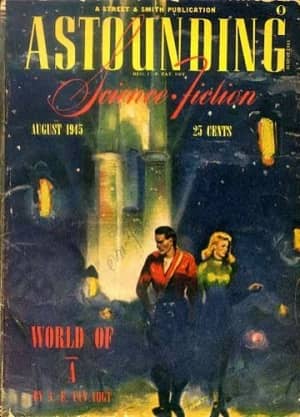Birthday Reviews: Murray Leinster’s “Pipeline to Pluto”

Murray Leinster was born William F. Jenkins on June 16, 1896 and died on June 8, 1975.
Murray Leinster was one of many nom de plumes used by William Fitzgerald Jenkins. He won the Liberty Award in 1937 for “A Very Nice Family,” the 1956 Hugo Award for Best Novelette for “Exploration Team,” and a retro-Hugo in 1996 for Best Novelette for “First Contact.” Leinster was the Guest of Honor at the 21st Worldcon in 1963 and in 1969 was inducted into the First Fandom Hall of Fame. In 1995, the Sidewise Award for Alternate History was established, named after Leinster’s story “Sidewise in Time.”
Jenkins holds patent #2727427, issued on December 20, 1955 for an “Apparatus for Production of Light Effects in Composite Photography” and patent 2727429, issued the same day for an “Apparatus for Production of Composite Photographic Effects.”
Leinster first published “Pipeline to Pluto” in the August 1945 issue of Astounding, edited by John W. Campbell, Jr. Ten years later, Groff Conklin included it in his anthology Science Fiction Terror Tales. It appeared in both versions of The Best of Murray Leinster, the British volume edited by Brian Davis and the American volume edited by J.J. Pierce (each book had a completely different table of contents). The story most recently appeared in First Contacts: The Essential Murray Leinster. Over the years, it has been translated into Japanese, Croatian, German, Italian, and Russian.
“Pipeline to Pluto” is a slight story, focusing on Hill’s attempts to get from Earth to Pluto via a system of cargos shuttles. A bruiser, all that Leinster lets the reader know about him is that he has an urgent need to stowaway in the “pipeline” and he has bought another stowaway’s rights to a place. The majority of the action looks at Hill’s attempts to convince Crowder and Moore, who run the smuggling ring, to get him off Earth that evening.
Hill’s pleading and threats to the men are punctuated with exposition in which Leinster explains how the pipeline works. A series of cargo ships, one launched each day from Pluto and one launched from Earth, forming a long line carrying supplies to Pluto and ores mined on Pluto back to the home planet. Leinster not only describes the vessels and how they launch, but eventually describes the impact of being on board the vessels to humans.